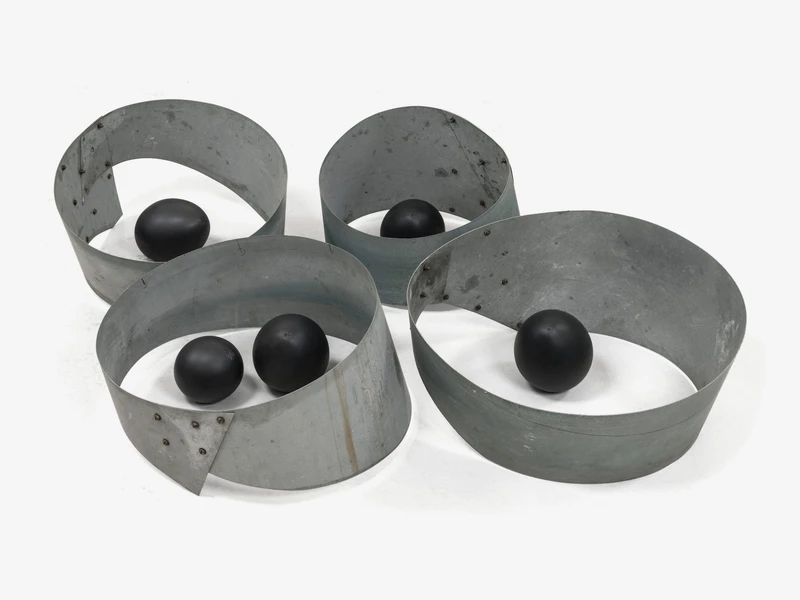Alison Wilding: Testing The Objects Of Affection
20 Sep-26 Oct 2024


The sculptures give off a sense of time and space crumpled, a collapse that pushes us into the present, directly. Ancient and modern materials collide, drawing out streams of consciousness…
Rosie Cooper - on the occasion of ‘Alison Wilding: Right Here and Out There’ at De La Warr Pavilion, 2018
Alison Wilding (b. 1948 Blackburn, UK) presents her first exhibition at Alison Jacques, a widely anticipated overview of the artist’s highly influential 50-year career. Spanning work from 1975 to the present day, the show allows an unprecedented insight into one of Britain’s major sculptors.
Emerging from the male dominated group ‘New British Sculpture’ in the 1980s, a reaction to Minimalism and Conceptual art marked a return to the incorporation of traditional materials and methods. As one of the few female artists within this group, Wilding’s work has often been under the radar in comparison to her male counterparts, despite solo exhibitions at MoMA, New York (1987), the Serpentine Gallery, London (1985), a retrospective at Tate Liverpool (1991) as well as Duveen Galleries Tate Britain (2013).
Wilding’s work is often discussed in terms of materials and shadow, concealment and revelation; the artist refers to her work as ‘mostly abstract sculptures’. Outside of abstraction, her practice is very much related to human desires and bodily encounters. As Wilding says, ‘sculpture can be sexy’. Wilding often pushes together and juxtaposes unlikely relationships between materials, including bronze, alabaster, wood, rubber, paper, copper, string and sand, illustrating a focus and continued exploration of balance, weight and line. This exhibition also gives us an insight into the scale at which Wilding works. Small arrangements of sculptures are presented on worktables from the artist’s East London studio. Works of an intimate scale, including a tiny desiccated frog found in the basement of the artist’s home, are shown in conversation with large free-standing and floor-based sculptures.
Wilding has constantly experimented with the boundaries of sculpture, side-stepping any traditional value orders, using the found and the made, the expensive and cheap with equal importance. ‘I like stuff and not particular materials’. Wilding’s works sit on the floor, leans precariously against walls, stand proud and, at times, seem to shift in proportion and definition as the viewer moves round the work. The involvement of the viewer - who must kneel, peer inside and duck to experience and reveal the pieces, has always been a central concern.
A vital part of Wilding’s practice is a continual interest in drawing. For Wilding, her works on paper possess a freedom that is impossible to replicate in sculpture, a practice without gravity in which ‘the right way up’ is always open for interpretation. These works on paper, presented alongside the artist’s intricate notebooks - in which works are numbered, thoughts are discussed, and ideas are sketched out - provide a fascinating and at times unexpected insight into her studio practice.
Wilding studied at Nottingham College of Art in 1966, at Ravensbourne College of Art and Design from 1967 to 1970, and then the Royal College of Art from 1970 to 1973 (where she was the only woman in her year group). Wilding has since been twice nominated for the Turner Prize (1988 and 1992) awarded an OBE (2018) and was made a Royal Academician (1999). Karsten Schubert London began representation of Wilding from 1987 to 2023. Wilding currently has a solo exhibition of works on paper on view at Heong Gallery, Downing College Cambridge and an exhibition of her drawings donated by the late Karsten Schubert at The Whitworth, Manchester until 2025. Her work is on permanent display at Tate Britain; other museum collections include the Art Gallery of New South Wales, Sydney; Arts Council Collection; British Museum; Henry Moore Institute, Leeds; Leeds City Art Gallery, Scottish National Gallery of Modern Art, Edinburgh and Victoria and Albert Museum, London.
Public commissions which are currently on view include Migrant at Snape Maltings, Suffolk, a drinking fountain at Rathbone Place, London, Still Water, at The National Memorial Arboretum and Swarm at 1 Grosvenor St, London.